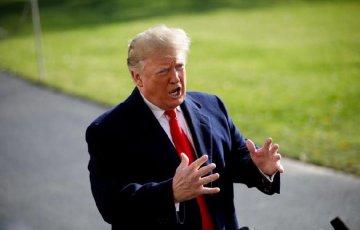The new giant tax package released by House Republicans earlier this week is not going to see a "wholesale passage" in the Congress, former Senator John Breaux said Thursday.
In a keynote speech on tax policy at the Brookings Institution, Breaux said House Republican Kevin Brady's bill is not going to be approved in the Senate. "They have no appetite for making some of those tax cuts permanent," said Breaux.
Brady, who will step down as House Ways and Means Committee chairman in January, released the 297-page tax bill on Monday, which would extend some tax breaks that are set to expire, address some glitches in the 2017 tax cut law, offer incentives for retirement savings, and revamp Internal Revenue Service (IRS). It will also provide tax relief for victims of the California wildfires and other natural disasters.
The tax package would cost the federal government 55 billion U.S. dollars over the next 10 years, according to a report released Wednesday by the Congressional Budget Office.
Breaux, once a senior Democratic member of the Senate Finance Committee and a widely recognized bipartisan leader, also noted "there is a possibility" that progress can be made on the Retirement Enhancement and Savings Act, which he believes there is a "strong bipartisan support" for.
In a panel discussion prior to Breaux's speech, Sandra Salstrom, a legislative representative for the American Federation of Government Employees, said the Democrats have "no incentive" to address the issue of retirement this year, because they have an incoming chairman "who has a longtime interest" in these areas.
Salstrom was talking about Democratic Representative Richard Neal, who is expected to replace Brady as House Ways and Means Committee chairman in January.
"Why would you pass something like this when you get to put your stamp on it a month from now and really dig in and do the issues the way you think it should be done," Salstrom said, adding that Neal's office has "put out paper" urging Democrats to oppose the bill.
"I don't think any part of the bill is going to pass," Howard Gleckman, a senior fellow in the Urban-Brookings Tax Policy Center at the Urban Institute, also the moderator of the discussion, told Xinhua after the event.
Gleckman believes not much will be done on tax policy during Congress' lame-duck session, the final weeks of the year before the Democrats take control of the House in January, and beyond. "Things always get partisan," he said.
In a keynote speech on tax policy at the Brookings Institution, Breaux said House Republican Kevin Brady's bill is not going to be approved in the Senate. "They have no appetite for making some of those tax cuts permanent," said Breaux.
Brady, who will step down as House Ways and Means Committee chairman in January, released the 297-page tax bill on Monday, which would extend some tax breaks that are set to expire, address some glitches in the 2017 tax cut law, offer incentives for retirement savings, and revamp Internal Revenue Service (IRS). It will also provide tax relief for victims of the California wildfires and other natural disasters.
The tax package would cost the federal government 55 billion U.S. dollars over the next 10 years, according to a report released Wednesday by the Congressional Budget Office.
Breaux, once a senior Democratic member of the Senate Finance Committee and a widely recognized bipartisan leader, also noted "there is a possibility" that progress can be made on the Retirement Enhancement and Savings Act, which he believes there is a "strong bipartisan support" for.
In a panel discussion prior to Breaux's speech, Sandra Salstrom, a legislative representative for the American Federation of Government Employees, said the Democrats have "no incentive" to address the issue of retirement this year, because they have an incoming chairman "who has a longtime interest" in these areas.
Salstrom was talking about Democratic Representative Richard Neal, who is expected to replace Brady as House Ways and Means Committee chairman in January.
"Why would you pass something like this when you get to put your stamp on it a month from now and really dig in and do the issues the way you think it should be done," Salstrom said, adding that Neal's office has "put out paper" urging Democrats to oppose the bill.
"I don't think any part of the bill is going to pass," Howard Gleckman, a senior fellow in the Urban-Brookings Tax Policy Center at the Urban Institute, also the moderator of the discussion, told Xinhua after the event.
Gleckman believes not much will be done on tax policy during Congress' lame-duck session, the final weeks of the year before the Democrats take control of the House in January, and beyond. "Things always get partisan," he said.
























Latest comments